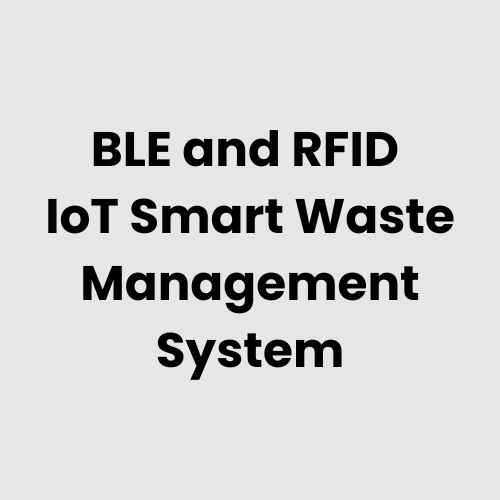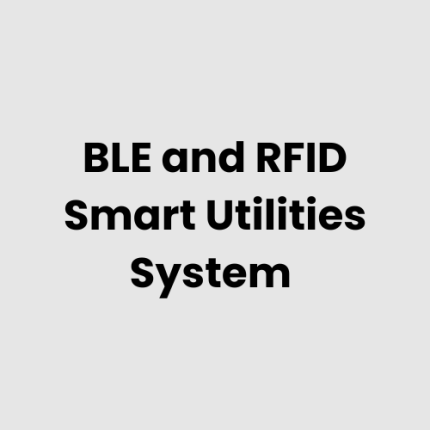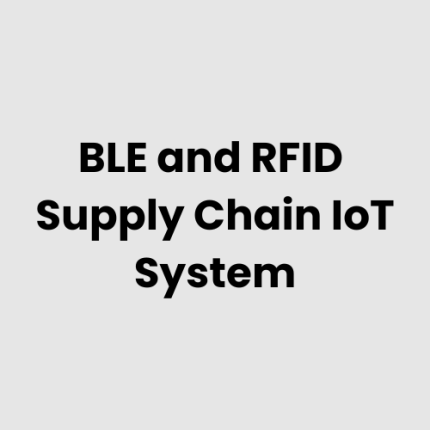Description
Technical Architecture of BLE and RFID IoT Enabled Smart Waste Management System
The BLE and RFID IoT Enabled Smart Waste Management System leverages cutting-edge technology to streamline waste collection processes. Its architecture includes:
- IoT-Enabled Waste Bins: BLE beacons and RFID tags embedded in waste bins provide real-time data on fill levels and bin status.
- IoT Gateways: Collect and transmit data from waste bins to local servers or cloud platforms.
- Central Processing Unit: A local server or cloud infrastructure processes collected data for analytics and optimization.
- User Interface: Web and mobile applications offer real-time monitoring, route planning, and actionable insights.
- Integration APIs: Facilitate seamless communication between hardware, middleware, and user applications.
- Communication Protocols: Supports Wi-Fi, LoRaWAN, and cellular connectivity for reliable data transmission.
List of Hardware Components
- Smart Waste Bins: Equipped with BLE beacons and RFID tags for tracking and monitoring.
- IoT Sensors: Ultrasonic, weight, and temperature sensors to detect bin status and fill levels.
- RFID Readers: Installed on collection vehicles for automated bin identification.
- IoT Gateways: Serve as hubs for data aggregation and transmission.
- Local Servers: High-capacity systems for on-premise data processing and storage.
- Mobile Devices: For real-time data access by waste collection personnel.
- Power Backup Systems: Ensure continuous operation of gateways and servers during outages.
Physical Placement Considerations
- Smart Bins: Strategically located in high-traffic areas and optimized for signal strength and accessibility.
- IoT Gateways: Deployed in locations with stable power and network connectivity for consistent data transmission.
- RFID Readers: Mounted on collection vehicles and near storage depots for automated tracking.
- Local Server Hardware: Installed in secure and climate-controlled facilities to ensure reliability.
- Sensors: Positioned to avoid interference while ensuring accurate measurements of waste levels.
Hardware Architecture
The hardware architecture emphasizes scalability and resilience:
- Input Layer: Smart bins with BLE and RFID transmit data about fill levels and location.
- Communication Layer: IoT gateways and readers aggregate and transmit data to servers.
- Processing Layer: Local servers or cloud systems analyze data for route optimization and waste management planning.
- Output Layer: User applications provide actionable insights and monitoring tools.
Deployment Considerations
- Connectivity: Ensure reliable communication networks, such as cellular or LoRaWAN, especially in remote areas.
- Redundancy: Incorporate backup gateways and servers to prevent system downtime.
- Environmental Durability: Use weatherproof smart bins and sensors for outdoor deployments.
- Integration: Seamlessly integrate with existing municipal waste management systems.
- Training: Provide training for waste management personnel to maximize system efficiency.
List of Relevant Industry Standards and Regulations
- ISO 14001 (Environmental Management)
- IEEE 802.15.4 (Wireless Communication for IoT)
- WEEE Directive (Waste Electrical and Electronic Equipment)
- OSHA Standards (Occupational Safety and Health)
- GDPR (General Data Protection Regulation)
- ISO 27001 (Information Security Management)
Local Server Version
For environments requiring on-premise data control, GAO Tek offers a local server version of the system. This configuration processes data in real-time without relying on cloud connectivity, ensuring robust operations in areas with limited or intermittent internet access. Local servers are configured for high reliability and comply with stringent security protocols.
Cloud Integration and Data Management
The cloud-enabled version of the system supports scalable data management and remote monitoring. Data from smart bins and gateways is securely transmitted to cloud servers for advanced analytics, predictive maintenance, and route optimization. GAO Tek ensures that all cloud operations comply with global data privacy regulations, offering encrypted storage and seamless accessibility.
GAO Tek Inc., headquartered in New York City and Toronto, Canada, is a leader in IoT-enabled waste management technologies. Our four decades of innovation and focus on quality assurance make us the trusted partner for municipalities, waste management companies, and government agencies. Visit GAO Tek Inc. to learn more about our solutions.
GAO Case Studies of BLE and RFID IoT Enabled Smart Utilities System
Case Studies in the USA
- New York, NY
A water utility provider in New York City deployed GAO Tek’s IoT system to monitor pipeline pressure and flow rates in real time. This solution minimized water loss and optimized energy consumption in pumping stations. Explore utility management practices at EPA’s Water Infrastructure Resources.
- Chicago, IL
In Chicago, an electric grid operator used GAO Tek’s BLE-enabled sensors to track transformer performance, enhancing predictive maintenance and reducing downtime. Learn about grid modernization at DOE Smart Grid Hub.
- Los Angeles, CA
A Los Angeles-based gas utility integrated RFID technology to monitor pipeline integrity and ensure compliance with safety standards. This system enhanced incident response times and improved regulatory compliance. See safety standards at PHMSA.
- Houston, TX
In Houston, GAO Tek’s smart meters with BLE technology were deployed to monitor energy usage in residential neighborhoods, providing real-time data for both customers and utility providers. Review smart metering initiatives at NIST Smart Grid Program.
- Miami, FL
A Miami water treatment plant implemented GAO Tek’s IoT-enabled system to optimize chemical dosing and monitor tank levels, resulting in cost savings and improved water quality. Explore treatment standards at AWWA.
- Boston, MA
Boston’s electricity provider utilized GAO Tek’s BLE-based load monitoring system to balance supply during peak demand, reducing outages and ensuring stable service. Learn more about load management at EPRI.
- Dallas, TX
In Dallas, GAO Tek’s RFID technology was deployed to track utility equipment across storage facilities, improving inventory management and reducing operational delays. See best practices in asset management at GS1.
- Seattle, WA
A Seattle energy company used GAO Tek’s BLE sensors to monitor renewable energy generation from wind turbines, enabling efficient grid integration. Explore renewable energy resources at DOE Wind Energy Technologies Office.
- San Francisco, CA
San Francisco’s water utility implemented GAO Tek’s smart sensors to detect leaks in aging pipelines, significantly reducing water wastage. Explore leak detection technologies at EPA WaterSense.
- Phoenix, AZ
In Phoenix, GAO Tek’s IoT system helped monitor solar panel efficiency, providing real-time performance analytics and improving energy output. Learn about solar standards at SEIA.
- Atlanta, GA
Atlanta’s wastewater management authority utilized GAO Tek’s BLE-enabled flow meters to optimize system performance and reduce overflow incidents. Review wastewater management standards at WEF.
- Philadelphia, PA
In Philadelphia, an electric utility integrated GAO Tek’s RFID technology to track and manage maintenance schedules for substations, reducing operational costs and improving system reliability. See asset tracking solutions at IEEE Standards Association.
- Denver, CO
A utility company in Denver adopted GAO Tek’s IoT-enabled solution for monitoring air quality around power plants, ensuring compliance with environmental standards. Explore monitoring methods at EPA Air Quality Resources.
- Portland, OR
Portland’s water utility implemented GAO Tek’s BLE-based system to track water usage patterns in real time, improving billing accuracy and customer satisfaction. See advanced metering infrastructure at Smart Energy Consumer Collaborative.
- Las Vegas, NV
In Las Vegas, a smart waste utility utilized GAO Tek’s RFID tags to streamline bin tracking and optimize collection routes, reducing operational costs. Learn about waste utility standards at SWANA.
Case Studies in Canada
- Toronto, ON
A Toronto utility provider integrated GAO Tek’s BLE-enabled sensors to monitor electricity distribution, improving outage management and system resilience. Explore utility trends at Ontario Energy Board. - Vancouver, BC
In Vancouver, a water utility leveraged GAO Tek’s IoT technology to monitor water quality remotely, ensuring compliance with health standards and enhancing customer confidence. Review water safety guidelines at Canadian Water and Wastewater Association.
GAO Tek Inc., headquartered in New York City and Toronto, Canada, continues to lead in smart utilities innovation, serving municipalities and organizations across North America. Visit GAO Tek Inc. for more information.
Navigation Menu for BLE and RFID IoT
- BLE Gateways, Beacons & Accessories
- UHF RFID Readers, Tags & Accessories
- NFC & HF RFID Readers, Tags & Accessories
- LF RFID Readers, Tags & Accessories
- BLE & RFID – Cloud, Server, PC & Mobile Systems
- BLE & RFID Resources
Navigation Menu for IoT
- LORAWAN
- Wi-Fi HaLow
- Z-WAVE
- BLE & RFID
- NB-IOT
- CELLULAR IOT
- GPS IOT
- IOT SENSORS
- EDGE COMPUTING
- IOT SYSTEMS
Our products are in stock and can be shipped anywhere in the continental U.S. or Canada from our local warehouse. For any further information, please fill out this form or email us.
We are actively looking for partners who are like us located in the U.S. and Canada. For more information on partnering with GAO, please visit Partner with GAO Tek Inc. It lists various ways to partner with GAO, such as OEM Partnerships, Technology Integration, Distribution and Reselling Opportunities, Presenting at the Leading Event Tek Summit, Joint R&D Projects, Training and Consulting Services, Industry-Specific Collaborations, Research and Academic Partnerships.



